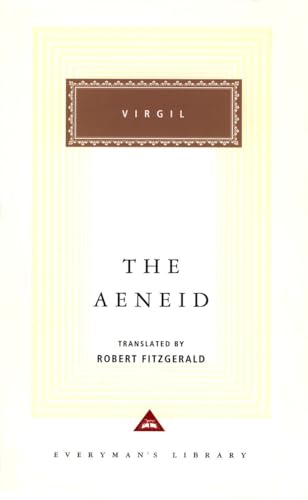
Inhaltsangabe
In dramatic and narrative power, Virgil’s Aeneid is the equal of its great Homeric predecessors, The Iliad and The Odyssey. It surpasses them, however, in the intense sympathy it displays for its human actors–a sympathy that makes events such as Aeneas’s escape from Troy and search for a new homeland, the passion and the death of Dido, the defeat of Turnus, and the founding of Rome among the most memorable in literature.
This celebrated translation by Robert Fitzgerald does full justice to the speed, clarity, and stately grandeur of the Roman Empire’s most magnificent literary work of art.
Die Inhaltsangabe kann sich auf eine andere Ausgabe dieses Titels beziehen.
Über die Autorin bzw. den Autor
Virgil (70 B.C-19 B.C) is regarded as the greatest Roman poet, known for his epic, The Aeneid (written about 29 B.C. unfinished). Virgil was born on October 15, 70 B.C., in a small village near Mantua in Northern Italy. He attended school at Cremona and Milan, and then went to Rome, where he studied mathematics, medicine and rhetoric, and completed his studies in Naples. Between 42 and 37 B.C. Virgil composed pastoral poems known as Ecologues, and spent years on the Georgics.At the urging of Augustus Caesar, Virgil began to write The Aeneid, a poem of the glory of Rome under Caesars rule. Virgil devoted the remaining time of his life, from 30 to 19 B.C., to the composition of The Aeneid, the national epic of Rome and to glory of the Empire. The poet died in 19 B.C of a fever he contracted on his visit to Greece with the Emperor. It is said that the poet had instructed his executor Varius to destroy The Aeneid, but Augustus ordered Varius to ignore this request, and the poem was published.
Von der hinteren Coverseite
This book is the equal of its great Homeric predecessors, The Iliad and The Odyssey, in dramatic and narrative power, and it surpasses them in the intense sympathy which makes events such as the passion and destruction of Dido and the fall of Turnus among the most memorable in literature.
Aus dem Klappentext
Introduction by Philip Hardie; Translation by Robert Fitzgerald
„Über diesen Titel“ kann sich auf eine andere Ausgabe dieses Titels beziehen.
Weitere beliebte Ausgaben desselben Titels
Suchergebnisse für The Aeneid: Introduction by Philip Hardie (Everyman's...
The Aeneid : Introduction by Philip Hardie
Anbieter: Better World Books, Mishawaka, IN, USA
Zustand: Good. Reprint. Former library book; may include library markings. Used book that is in clean, average condition without any missing pages. Artikel-Nr. 6081681-6
The Aeneid (Everyman's Library (Cloth))
Anbieter: Revaluation Books, Exeter, Vereinigtes Königreich
Hardcover. Zustand: Brand New. reprint edition. 483 pages. 8.25x5.25x1.25 inches. In Stock. Artikel-Nr. 0679413359
Neu kaufen
Anzahl: 1 verfügbar

